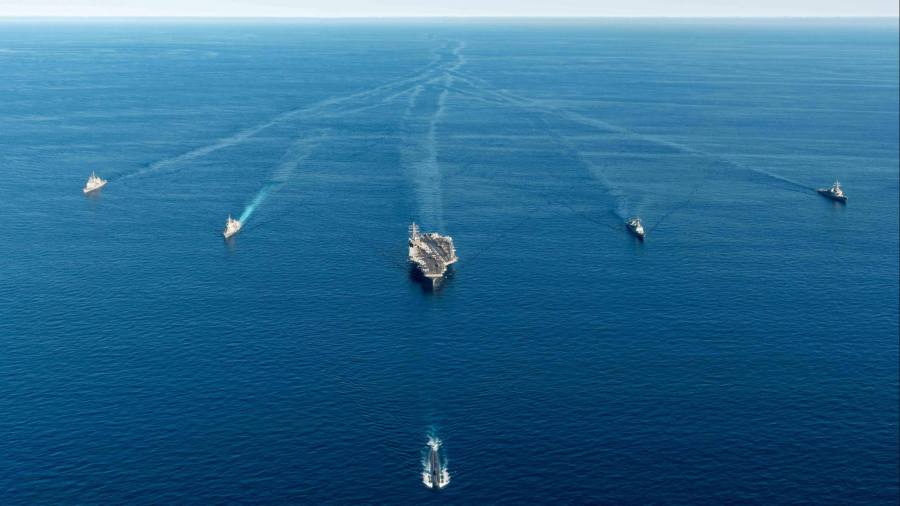
Receive free US foreign policy updates
We’ll send you a myFT Daily Digest email rounding up the latest US foreign policy news every morning.
The US wants Japan and South Korea to agree that each nation has a duty to consult the others in the event of an attack, as Washington pushes for a historic joint statement when the leaders hold a trilateral summit at Camp David this month.
Washington has bilateral alliances with Tokyo and Seoul, which have a history of turbulent relations over Japan’s wartime practices. But the White House wants to bring its two Pacific allies closer to boost deterrence against North Korea and China, according to four people familiar with the situation.
Officials are still negotiating the text of the statement that US president Joe Biden, Japanese prime minister Fumio Kishida and South Korean president Yoon Suk Yeol plan to issue at the presidential retreat on August 18.
In addition to pressing for the language on consultations, the White House is urging Tokyo and Seoul to state that the countries have mutual vulnerabilities — a reference to North Korea and China — that would enhance deterrence and facilitate defence co-operation.
The three sides are also discussing installing a trilateral leader-level hotline and are expected to unveil other measures at the summit, including strengthening trilateral exercises, cyber security, missile defence and economic security.
Christopher Johnstone, a former CIA official and Pentagon Japan expert now at the CSIS think-tank, said a communiqué that deepened security links between the Asian neighbours would be a landmark achievement.
“A statement by Tokyo and Seoul affirming that their security is interconnected would be historic, and one difficult for future leaders in either country to repudiate,” said Johnstone. “It would send a message of common interest and purpose that would be heard of course in Pyongyang, but perhaps even more loudly in Beijing.”
The White House declined to comment. The South Korean government did not immediately respond to a request for comment. The Japanese government also declined to comment, but officials noted that the US-Japan security treaty did not allow trilateral collective defence.
“We will be exploring new ways to strengthen security co-operation in the face of the nuclear and missile threat from North Korea and China, but it will be step by step,” said one Japanese official.
The US is trying to capitalise on a recent improvement in Japan-South Korea ties after years of tension over Tokyo’s forced labour and sexual slavery practices during the second word war. Tokyo and Seoul in March restored an intelligence-sharing pact that had been dormant for four years. The US, South Korean and Japanese navies also conducted joint missile defence exercises this year to address the rising threat from North Korea.
US ambassador to Japan Rahm Emanuel declined to comment on the specific negotiations but said Washington and its allies were taking significant steps. “The USA is a permanent Pacific power much to China’s fierce opposition,” he said. “The trilateral partnership is a significant strategic shift in favour of our collective vision.”
The effort to bring Tokyo and Seoul closer is the latest part of the Biden administration’s strategy to enhance alliances in the Indo-Pacific region. Others include the Quad — a security grouping of the US, Japan, Australia and India — and the Aukus security pact the US signed with the UK and Australia to help Canberra obtain nuclear-powered submarines.
“Of all the coalitions that the Biden administration is building, the US-Japan-Korea axis is the most worrisome for China,” said Bonnie Glaser, a China expert at the German Marshall Fund.
“The continuous strengthening of defence co-operation among the US, Japan and Korea, which, in recent months has included closer missile defence joint exercises and data sharing, will cause a significant deterioration in China’s security environment,” Glaser added.
The US push is being spearheaded by Kurt Campbell, the White House Asia adviser who was also the driving force between the Quad and Aukus arrangements.
The statement would not amount to a formal collective security agreement, but it would be a big step in the rapprochement of Tokyo and Seoul, which are moving closer over the shared threats from China and provocations from Pyongyang.
“Tokyo and Seoul are increasingly signalling that enhanced security co-ordination is essential for their respective national security and that an act of military aggression anywhere in the region would have implications for both,” said Danny Russel, a former White House official now at the Asia Society Policy Institute. “They have abandoned their ‘not my problem’ attitude.”